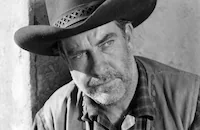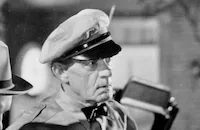Goin' to Town
Brief Synopsis
Cast & Crew
Alexander Hall
Mae West
Paul Cavanaugh
Gilbert Emery
Marjorie Gateson
Tito Coral
Film Details
Technical Specs

Synopsis
Cleo Borden, a saloon dancer and femme fatale, signs an agreement with cattle rustler Buck Gonzales to marry him if he will deed his oil-filled land to her. When Gonzales is killed, Cleo instantly becomes a millionaire. On the ranch, Cleo tries to seduce British land surveyor Edward Carrington, but he resists her after realizing she placed a bet on her conquest of him. Carrington then leaves for the international horse races in Buenos Aires and Cleo follows, hoping to transform herself into a lady by entering her own horse "Cactus" into the race. In Buenos Aires, high society is both amused and appalled by Cleo's bawdy humor and bold style, while the Russian millionaire Ivan Valadov begins to keep company with her. Cleo bets Valadov's mistress, Mrs. Crane Brittony, $20,000 that Cactus will win, and she in turn places $20,000 on her horse, Bonnie Lassie. Lady Brittony schemes to keep Cactus out of the race, but her plans are foiled by Cleo's Indian assistant Taho, and Cactus wins. Meanwhile, Lady Brittony's nephew, Fletcher Colton, an obsessive gambler, loses his fortune; and Cleo, believing she needs a title to win Carrington, offers to marry him in name only. Back in the United States, the new couple resides in Southampton, where Cleo stages an opera of Samson and Delilah . Carrington arrives at the gala with the newly-acquired title of Earl of Stratton to swear his love to Cleo. Meanwhile, Lady Brittony tries to ruin Cleo's reputation by staging a rendezvous with Cleo and Valadov in Cleo's boudoir. While Valadov hides in Cleo's room, however, Colton discovers him and pulls a revolver from Cleo's drawer. The two men struggle, Colton shoots himself and Cleo is accused of murder. When Cleo discovers Valadov's cigarette in the ashtray and Taho implicates him for Colton's murder, however, Valadov confesses Lady Brittony's scheme. Cleo then becomes Lady Stratton.

Director

Alexander Hall
Cast

Mae West

Paul Cavanaugh

Gilbert Emery

Marjorie Gateson
Tito Coral
Ivan Lebedeff
Fred Kohler

Monroe Owsley

Grant Withers
Luis Alberni
Lucio Villegas
Mona Rico
Wade Boteler

Paul Harvey
Joe Frye
Vladimar Bykoff
Adrienne D' Ambricourt
Francis Ford
Dewey Robinson
Stanley Andrews
Rafael Storm
Robert Beckoff
Andrés De Segurola
Pearl Eaton
Joe Twerp
J. P. Mcgowan
Jules Cowles
Jack Pennick
Sammy Stein
Robert Dudley
Ivar Mcfadden
Albert Conti
Julian Rivero
Gino Corrado
Carlos Villar
George Renault
Frank Mundin
Stanley Price
Bert Morehouse
George Guhl

Lew Kelly
Harold Entwistle
Henry Mowbray

Leonid Kinskey
Virginia Hammond
Laura Treadwell
Nell Craig
Morgan Wallace
Cyril Ring
Jack Kennedy
James Pierce
Bert Roach
Tom London

Irving Bacon
Sid Saylor
Ramon Ros
Dolores Duran
William Beggs
Ronald Rondell
Tom Ricketts
Sheldon Jett
Paulett Paquet
Mirra Rayo
Thomas Monk
O. M. Steiger
Max Lucke
Frank Mayo
Henry Roquemore
Ted Oliver
Charles Mcmurphy
Eugene Borden
Franco Corsaro
Germaine De Neel
Crew
Travis Banton
Sam Coslow
George B. Dowell
Hans Dreier
James Dugan
Sammy Fain
Irving Kahal
William Le Baron
Marion Morgan
M. M. Paggi
Leroy Stone
Karl Struss
Robert Usher
François B. De Valdes
Mae West
Adolph Zukor

Film Details
Technical Specs

Quotes
What excuse has a gal like you for runnin' around single?- Young Fellow
Mmm, I was born that way.- Cleo Borden
With any other dame, I wouldn't give a hoot. When it comes to you, I'm dynamite!- Buck Gonzales
Yes, and I'm your match.- Cleo Borden
You ain't scared of me 'cause they say I'm a bad man?- Buck Gonzales
I'm a good woman for a bad man.- Cleo Borden
Cigarette me, Cossack.- Cleo Borden
For one kiss of your lips I would give half of my life.- Ivan Valadov
Oh, see me tomorrow, I'll kiss you twice.- Cleo Borden
But now I'm a lady / Come up and see me some time.- Cleo Borden
Trivia
Notes
This film's working titles were Now I'm a Lady and How Am I Doin'? According to a news item in Daily Variety, Paramount tried to borrow Cesar Romero for the male lead, but Universal turned down the deal, claiming he was needed there. Daily Variety also reported that Mae West visited the Sherman Indian School in Riverside, CA to handpick a Native American for an important role in this film. Male students lined up on the football field, where West looked them over, principally for good looks, as the part required a "looker for whom the society dames in the film will fall." Although Vladimar Bykoff appears last in the opening credits of the viewed print, he is not listed in the end credits and it is unclear what his character name is. According to a Film Daily news item, Sammy Fain and Irving Kahal wrote a song called "Love Is Love in Any Woman's Heart" for this film, but it was not in the viewed print. Motion Picture Daily remarked that the best shot in the film shows "Cleo Borden's" race horse, "Cactus," being put to bed in her palatial Buenos Aires home.
According to files in the MPAA/PCA Collection at the AMPAS Library, on December 19, 1934, Joseph I. Breen, Director of the Production Code Administration, wrote to Paramount distribution executive John Hammell after reading this film's first script with this reaction: "...basically it seems to be in conformity with the requirements of the Production Code." However, Breen cautioned Hammell against any indication of prostitution, and recommended that the studio change the underlined portion of Mae West's line, "I was ashamed of myself for the way I lived." He also forbade the filmmakers to show actual scenes of cattle being branded, and recommended that they change the nationality of Ivan Lebedoff's character from an Argentinian: "As you know, the Argentines are particularly sensitive about being characterized as gigolos, and inasmuch as part of your picture is laid in Buenos Aires, any such characterization would probably appear to them to be doubly offensive." On January 4, 1935, François B. de Valdez was hired as technical advisor on South American sequences. The film was approved on April 1, 1935. Breen later wrote to Will H. Hays, head of the PCA, defending Paramount's cooperation with the Code: "The studio [has] conscientiously avoided the more serious difficulties that have attended some of this star's [Mae West] previous pictures." Breen did receive some criticism for passing the film, however. E. Robb Zaring, superintendent of the Indiana Conference of the Methodist Episcopal Church, wrote Breen a letter of protest on May 31, 1935, which read: "I have not seen the screen nor will I. The New York Times pronounces it a vulgar, demoralizing exhibition....this play was produced after the blare of reform. I agree that [much] good has been done-thanks to the leadership of the Roman Catholic Church. But what I cannot understand is how this particular actor who stands for a particular phase of morals should have been permitted to put another over on the American youth." Breen responded to Zaring by quoting a radio broadcast by the motion picture bureau of the International Federation of Catholic Alumnae in which it placed this film on its endorsed list-the first time it had ever endorsed a Mae West film. The federation attributed the endorsement to the work of the Legion of Decency. On October 12, 1935, Motion Picture Herald printed a letter from J. E. Stocker, of the Myrtle Theatre in Detroit, which read: "More pictures like this and it won't be long before the League of Decency will be on the warpath again....The League of Decency were a great influence in bringing about the making of more wholesome pictures which helped the entire motion picture industry toward greater prosperity." Lyrics to the songs in the film were substantially changed in order to meet the requirements of the Code. The chorus to "Now I'm a Lady" originally read: "I used to have a lot of sweet sugar daddies/As much as seven or nine/But now I'm a lady, I see them one at a time./I used to baby all those sweet sugar daddies/To keep my cloud silver lined/But now I'm a lady, I get my sugar refined." Breen's reaction to these lyrics was as follows: "As we read it, it is the boasting of a woman of loose morals who has had any number of men in her time, and has climbed over them to the top of the ladder where she has finally married respectability." Breen told Paramount that if the lyrics were included in the film, the PCA could not pass it.












